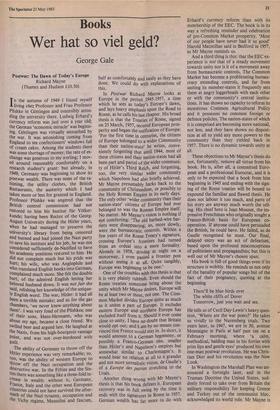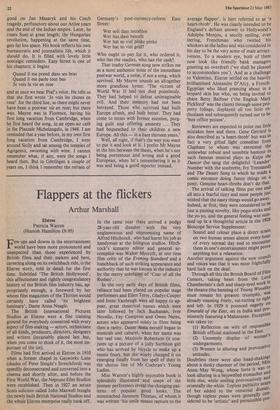Books
Wer hat so viel geld?
George Gale
Postwar: The Dawn of Today's Europe Richard Mayne (Thames and Hudson £10.50)
In the autumn of 1949 I found myself living chez Professor and Frau Professor Plishke in Gottingen and ostensibly atten- ding the university there. Ludwig Erhard's currency reform was just over a year old; the German 'economic miracle' was beginn- ing. Gottingen was virtually unscathed by the war. It was astonishing coming from England to see confectioners' windows full of cream cakes. Among the students there was some shortage of money; the rate of ex- change was generous to my sterling; I mov- ed around reasonably comfortably on a research student's grant: but already, in 1949, Germany was beginning to show its Postwar wealth. There was none of the ra- tioning, the utility clothes, the British Restaurants, the austerity which I had taken more or less for granted in England. Professor Plishke was angered that the British control commission had not restored to him his Institut ftir VOlker- kunde; having been Rector of the Georg- August University during the Hitler years, when he had managed to preserve the university's library from being censored and burned and had joined the Nazi party to save his institute and his job, he was not considered sufficiently de-Nazified to have his academic positions restored to him. He did not complain much but his pride was hurt; his wife, who was Anglophile and who translated English books into German, complained much more. She felt the double hurt, of the admired English letting her beloved husband down. It was not fair she said, relishing her knowledge of the unique- ly English word. The war, Hitler: it had all been a terrible mistake; and as for the gas chambers, 'we never knew anything about them'. I was very fond of the Plishkes; one of their sons, Hans-Hermann, who was about my age, became a close friend. We swilled beer and argued late. He laughed at the Nazis, from his high-bourgeois vantage Point, and was not over-burdencd with guilt.
The ability of Germany to throw off the Hitler experience was very remarkable; so, too, was the ability of western Europe to throw off the Nazi occupation and the destructive war. In the Fifties and the Six- ties there was something like a three-fold in- crease in wealth: without it, Germany, France, Italy and the other west European countries could not have survived the after- math of the Nazi tyranny, occupation and the Vichy regime, Mussolini and fascism, half as comfortably and easily as they have done. We could do with explanations of this.
In Postwar Richard Mayne looks at Europe in the period 1945-1957, a time which he sees as today's Europe's dawn, and lays heavy emphasis upon the Road to Rome, as he calls his last chapter. His broad thesis is that the Treaties of Rome, signed on 25 March, 1957, secured European pros- perity and began the unification of Europe: 'For the first time in centuries, the citizens of Europe belonged to a wider Community than their nation-state' he writes, conve- niently forgetting that until 1944, most of these citizens and their nation-states had all been part and parcel of the wider communi- ty of Hitler's Third Reich, and forgetting, too, the very similar wider community which Napoleon had also briefly achieved. Mr Mayne presumably harks back to the community of Christendom, or possibly to the Holy Roman Empire in its early days. The only other 'wider community than their nation-state' citizens of Europe had ever belonged to was the Roman Empire itself. No matter. Mr Mayne's vision is nothing if not comforting: 'The old barbed-wire bar- riers were disappearing; so, more slowly, were the bureaucratic controls. Within a few years of the Rome Treaty's signature, crossing Europe's frontiers had turned from an ordeal into a mere formality. Already in 1958, driving at night on a motorway, I even passed a frontier post without seeing it at all. Quite tangibly, Europe was beginning
to be one.'
One of the troubles with this thesis is that it is very plainly rubbish. Even should the Rome treaties sometime bring about the unity which Mr Mayne desires, Europe will be at least two or three, not one. The Com- mon Market divides Europe quite as much as it unites a part of Europe. It excludes eastern Europe and northern Europe has excluded itself from it. Should it ever come close to unity, I have no doubt that Britain would opt out; and I am by no means con- vinced that France would stay in. In short, it would amount to a German hegemony, or possibly a Franco-German one, smaller than Hitler's and Napoleon's empires but somewhat similar to Charlemagne's. It would bear no relation at all to a grander and not more unrealistic vision, de Gaulle's of a Europe des patries stretching to the Urals.
Another thing wrong with Mr Mayne's thesis is that his book defeats it. European recovery was in full swing by the time it ends with the signatures in Rome in 1957. German wealth has far more to do with Erhard's currency reform than with its membership of the EEC. The book is in its way a refreshing reminder and celebration of pre-Common Market prosperity. 'Most of our people have never had it so good' Harold Macmillan said in Bedford in 1957, as Mr Mayne reminds us.
And a third thing is this: that the EEC ex- perience is not that of a steady movement towards unity nor is it of a movement away from bureaucratic controls. The Common. Market has become a proliferating bureau- cracy extending controls, and far from uniting its member-states it frequently sets them at angry loggerheads with each other or with the community's central institu- tions. It has shown no capacity to reform its monstrous Common Agricultural Policy and it possesses no common foreign or defence policies. The nation-states of which it is comprised are becoming more national, not less, and they have shown no disposi- tion at all to yield any more powers to the community than they yielded back in 1957. There is no dynamic towards unity at all.
These objections to Mr Mayne's thesis do not, fortunately, remove all virtue from his book. He is, after all, a committed Euro- pean and a professional Eurocrat, and it is only to be expected that a book from him beginning in 1945 and ending with the sign- ing of the Rome treaties will be bound to expound the familiar and flawed thesis. He does not labour it too much, and parts of his story are anyway much worth the tell- ing. His chief hero is Jean Monnet, the im- pressive Frenchman who originally sought a Franco-British basis for European co- operation. If anyone could have persuaded the British, he could have. He failed, as de Gaulle recognised he must. Our final, delayed entry was an act of defeatism, based upon the profound misconceptions of politicians and propagandists; but this is well out of Mr Mayne's chosen span.
His book is full of good things even if its structure is wobbly. He reminds us not only of the banality of popular songs but of the fact of their poignancy, quoting at the beginning There'll be blue birds over The white cliffs of Dover Tomorrow, just you wait and see.
He tells us of Cecil Day-Lewis's heavy ques- tion, 'Where are the war poets?' He takes us vividly to the Nuremberg trials. Two years later, in 1947, we are in 30, avenue Montaigne in Paris at half past ten on a February morning, where 'a calm, methodical, balding man in his forties with prim lips and gentle eyes' produced his own one-man postwar revolution. He was Chris- tian Dior and his revolution was the New Look.
In Washington the Marshall Plan was an- nounced a fortnight later, and in the Truman Doctrine the United States, sud- denly forced to take over from Britain the military responsibility for keeping Greece and Turkey out of the communist bloc, acknowledged its world role. Mr Mayne is good on Jan Masaryk and his Czech tragedy, perfunctory about our Attlee years and the end of the Indian empire. Later, he treats Suez at great length; the Hungarian revolution, happening at the same time, gets far less space. His book reflects his own bureaucratic and journalistic life, which it should do. It is filled with lovely little nostalgic reminders. Easy Street is one of his chapters; it begins Quand it me prend dans ses bras Quand it me parle tout bas Je vois la vie en rose
and at once we hear Piaf's voice. He tells us that she first wrote `Je vois les choses en rose' for the third line, so there might never have been a postwar vie en rose; but there was. Mayne was in Florence, having his first long vacation from Cambridge, when he first heard the song, in an open-air cafe in the Piazzale Michelangelo, in 1948. I am reminded that a year before, in my own first long vacation from Cambridge, I went around Sicily and sat among the temples of Agrigento, swooning with wine. I cannot remember what, if any, were the songs I heard then. But in Gottingen a couple of years on, I think I remember the refrain of
Germany's post-currency-reform Easy Street: Wer soil dass bezahlen Wer has dass bestellt Wer hat so viel pinke pinke Wer hat so viel geld?
Who ought to pay for it, who ordered it, who has the readies, who has the cash?
That trashy German song now strikes me as a most authentic noise of the immediate postwar world, a noise, if not a song, which survived. Mr Mayne sounds an altogether more grandiose hymn: 'The victims of World War II had not died pointlessly. They had helped to defeat unimaginable evil. And their memory had not been betrayed. Those who survived had built Europe afresh, and built better. They had come to terms with former enemies, purg- ing guilt and offering amnesty ... They had bequeathed to their children a new Europe. All this in a bare thirteen years.'
Well, all right, if that's the way you want to put it and look at it. I prefer Mr Mayne in the bits between the thesis, when he's not being portentous and wrong and a good European, when he's remembering it as it was and being a good reporter instead.











































 Previous page
Previous page